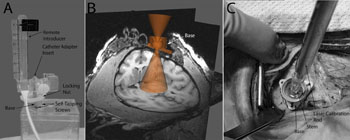RT Intraoperative MRI Imaging Improves Stem Cell Therapy for Parkinson's Disease
By MedImaging International staff writers
Posted on 19 Oct 2016
Researchers have demonstrated that Real-Time Intraoperative Magnetic Resonance Imaging (RT-IMRI) can be used for guiding and monitoring stem cell therapy for Parkinson's disease.Posted on 19 Oct 2016
The research subjects were primates modeled with Parkinson's disease. The researchers used RT-IMRI to guide the transplantation of iPSC (induced Pluripotent Stem Cell) derived neurons into the brains of the primates and found that the technique improved cell survival, and provided improved visualization and monitoring during the procedure.

Image: The details of the technique used for MRI-guided transplantation of neural stem cells into the Parkinsonian brain (Photo courtesy of Vermilyea SC).
The researchers from the Preclinical Parkinson's Research Program Center, University of Wisconsin-Madison, (Madison, WI, USA) will publish the results of their study in the upcoming October 2016, issue of the journal Cell Transplantation.
The results showed that the RT-IMRI system could be used for intracerebral targeting and delivery of iPSC-derived neuroprogenitors. The technique enables clinicians to monitor cell uploading and infusion. The researchers also found that the cells that had been transplanted and grafted had survived well in the test animals.
Dr. Paul R. Sanberg, distinguished professor, University of South Florida (Tampa, FL, USA), said, "Cell therapy is the cornerstone of regenerative medicine for neurodegenerative disease. With the advent of iPSCs, the field has made significant advances. The current study expounds upon those advances by addressing logistical concerns regarding cell administration and tracking. This method has wide applicability and may be relevant for not only Parkinson's disease, but other neurodegenerative conditions as well."
Related Links:
Preclinical Parkinson's Research Program Center














